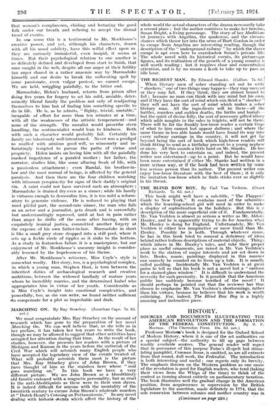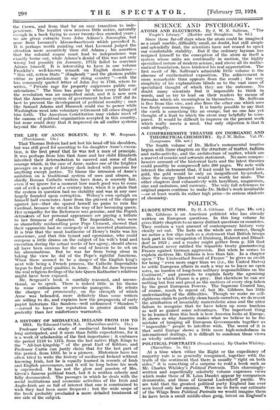HISTORY.
SOURCES AND DOCUMENTS ILLUSTRATING TILE AMERICAN REVOLUTION AND THE FORMATION OF THE FEDERAL CONSTITUTION. By S. E. Morison. (The Clarendon Press. 10s. 6d. net.)
Professor Morisen's book is designed for the Oxford School of Modern History, where it is one of the set authorities on a special subject—the authority to fill up gaps between readily available sources. The general reader will regret that in pursuance of this purpose Paine's ill-spelt but stimu- lating pamphlet, Common Sense, is omitted, as are all extracts from that sound, dull work, the Federalist. The introduction is both interesting and useful • one regrets only its brevity. The emphasis thrown on the 'Western problem as one cause of the revolution is good for English readers, who tend (taking their views from the Whigs of the time) to think of the contest as turning almost entirely on parliamentary taxation. The book illustrates well the gradual change in the American position, from acquiescence in supervision by the British legislature to the assertion, made definitely in 1774, that the sole connexion between colonies and mother country was in (Continued on page 298.) the Crown, and from that by an easy transition to inde- pendence. The loyalist view receives little notice, naturally enough in a book trying to cover twenty-five crowded years ; we are given extracts from John Adams's Novanglus, but none from Leonard's Itlassachusettensis which provoked it. It is perhaps worth pointing out that Leonard judged the situation more accurately than did Adams • his assertion that the colonial course must lead to independence was exactly borne out, while Adams's denial of this was not only wrong but possibly (in January, 1775) failed to convince Adams himself. It is interesting to have in one volume Franklin's well-known remark on English decadence- " this old, rotten State " (England) " and. the glorious public virtue so predominant in our rising country "—with the less commonly quoted letter of John Jay in 1786, where he writes, " Private rage for property suppresses public con- siderations." The time has gone by when every father of the revolution was an unspotted saint, and it is now seen that the American system of government before 1787 did its best to prevent the development of political morality ; men like Samuel Adams and Hancock could rise to power while Washington- went into voluntary retirement till crises dragged him forth. The American Constitution may violate most of the canons of political organization accepted in this country, but none could deny that it improved on all earlier systems beyond the Atlantic.











































 Previous page
Previous page